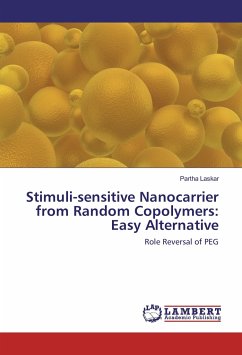
Nanocarriers for drug delivery in the treatment of human diseases
Challenges and Trends
Versandkostenfrei!
Versandfertig in 6-10 Tagen
29,99 €
inkl. MwSt.

PAYBACK Punkte
15 °P sammeln!
The use of nanocarriers as delivery systems for drugs to therapeutic agents may increase as pharmacological properties of commonly used compounds in the treatment and diagnosis of human diseases. Advances in nanoparticle surface engineering of nanohybrid materials for the accommodation of target ligands have made nanocarriers attractive candidates for future work involving targeted drug delivery. In this sense, "Nanocarriers for drug delivery in the treatment of human disease: challenge and trends" is a scientific book that aims to report the advances in the use of nanocarriers for the treatme...
The use of nanocarriers as delivery systems for drugs to therapeutic agents may increase as pharmacological properties of commonly used compounds in the treatment and diagnosis of human diseases. Advances in nanoparticle surface engineering of nanohybrid materials for the accommodation of target ligands have made nanocarriers attractive candidates for future work involving targeted drug delivery. In this sense, "Nanocarriers for drug delivery in the treatment of human disease: challenge and trends" is a scientific book that aims to report the advances in the use of nanocarriers for the treatment and diagnosis of human diseases, with a special focus on nanocarriers for cancer and neurodegenerative diseases. This book consists of 5 chapters that describe the synthesis, characterization, and applications of nanocarriers in human diseases, in addition, to discussing the challenges observed in the application of nanocarriers in clinical studies. For those professionals involved in bioanalytical, nanomedicine, and toxicology, among other areas, this book will be a useful reference, while providing valuable information from a transdisciplinary point of view.












